Bring Me The Horizon drummer Matt Nicholls on confidence, computer composition, clicks and more
From tiny metal clubs to headlining Wembley, it's been an eventful 12 years
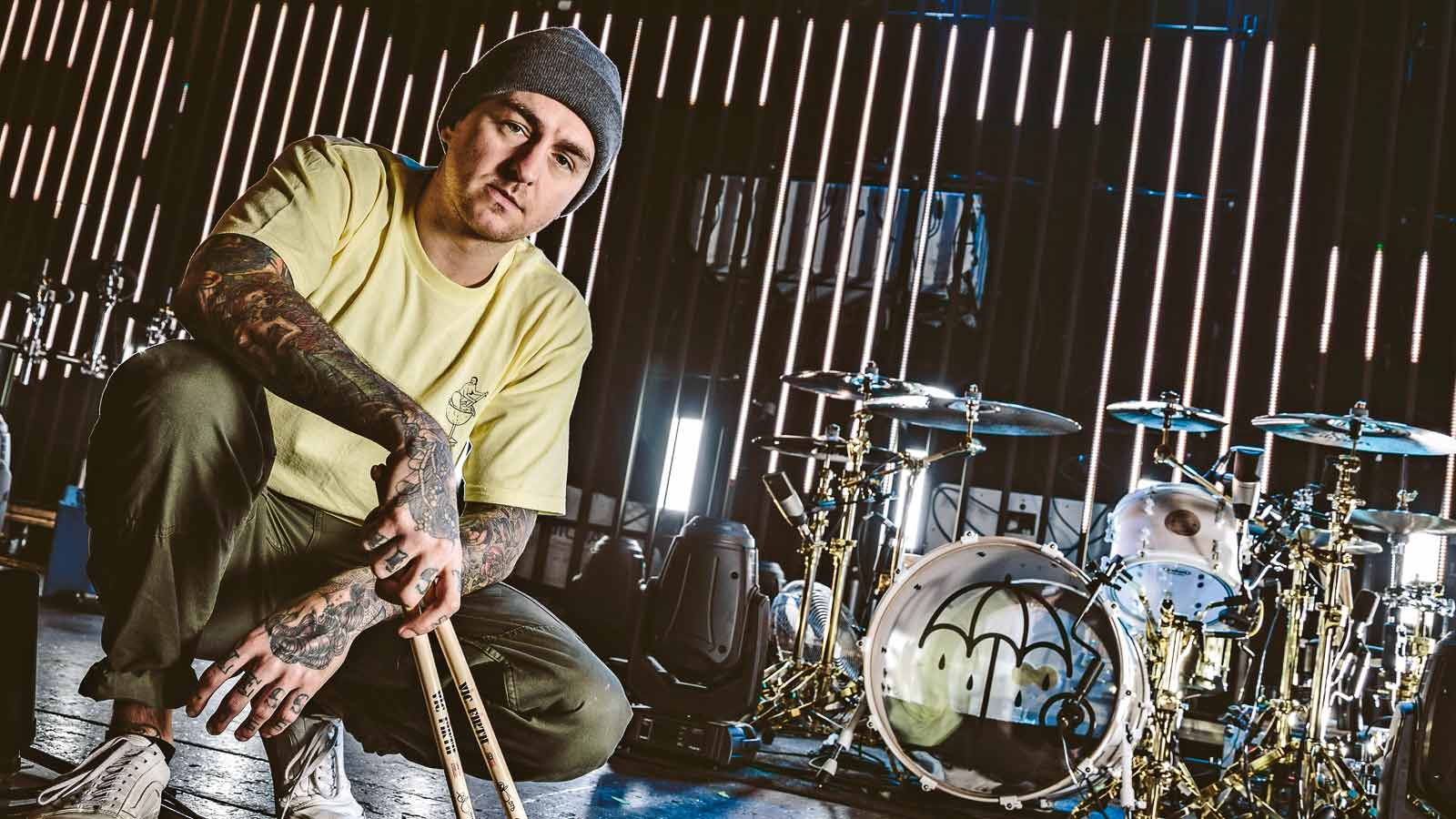
Introduction
It’s been seven years since we last spoke with Bring Me The Horizon drummer Matt Nicholls. The band’s second album of energetic metalcore Suicide Season had just been released to mixed reviews.
But it was to mark the first glimmers of the band’s success to come, and the shy young drummer we met backstage at Bristol’s 2,000-capacity Academy was feeling good about where the band was headed, if freely admitting to a lack of drumming nouse or chops.
Energised from a sold-out headline gig at London’s cavernous Alexandra Palace two days before this latest interview, we find ourselves back at that same Bristol venue with Matt – approaching his 30th birthday – preparing for a now rare ‘intimate’ show with the band.
To say things have changed is an understatement. The members of Bring Me The Horizon are now familiar with arenas and Number Two albums, and the maturity of their latest music has silenced and converted former critics.
Matt is in good shape and more heavily tattooed, but it’s the confidence in his own abilities behind the kit that is most striking.
Bring Me The Horizon’s latest albums: 2013’s Sempiternal and last September’s chart-topping That’s The Spirit marked a palpable change in the band’s songcraft.
Prior to writing Sempiternal they called on the services of keyboard player Jordan Fish. Self-deprecatingly branded by Matt as “a proper musician”, Fish brought a new ear and new excitement to the camp, leading to a different direction that added more electronics and sonic textures whilst reducing the heaviness, but maintaining the muscle the band had become known for.
Working with Fish forced each member to step up, including Matt. As the band continues to take over the world, Matt tells Rhythm all about having to adapt to Bring Me The Horizon 2.0, why he’s loving being a proper drummer and finally getting rid of his China.
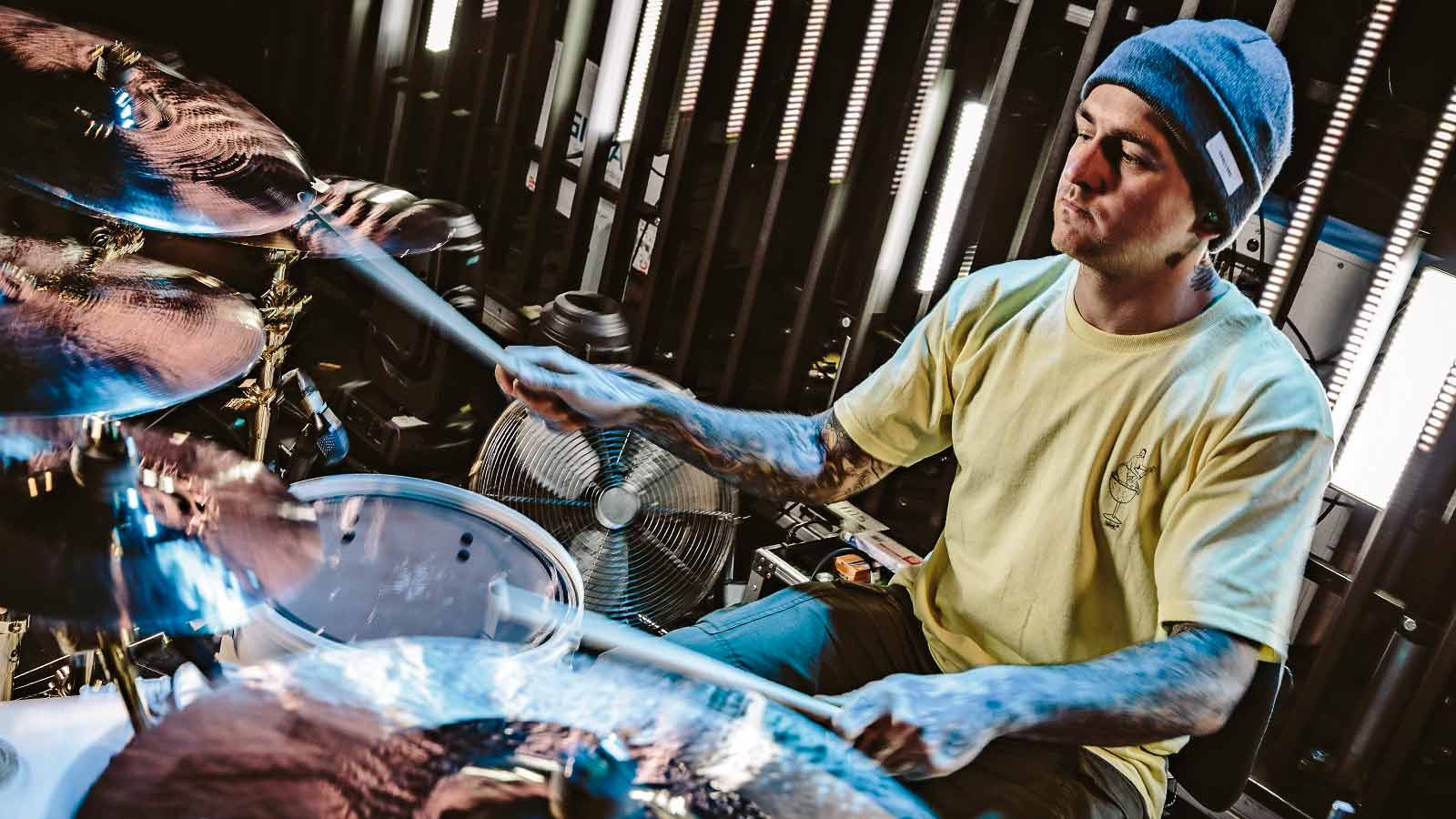
Improving technique and team writing
The last two Bring Me The Horizon albums represent a new maturity in the band’s songwriting and, in particular, your drumming. Would you agree?
“I think you’re right. I’ve had to adapt. When the band started I never really learned the proper way to drum. I just learned to play fast. I never learned chops or anything like that, I kinda got thrown into it.
"I could barely play drums when we started the band, I was just scraping by."
"I could barely play drums when we started the band, I was just scraping by. I was thrown into this whole touring lifestyle. We’d only been a band about two or three months and we did our first tour. It was crazy. On these last two albums the music’s matured and I’ve had to adapt my playing to suit the style of music.”
Have you worked on technique on your own, or have you adapted naturally as you’ve gained more experience writing, recording and playing live?
“I’ve spent a bit more time learning new techniques. When I used to come back off tour, and I’d been out for two and a half months, I’d come home for three or four weeks and [drums] was the last thing on my mind.
"When I used to be at home the last thing I’d want to do is play drums or learn something, I just wanted to chill. Really it’s been me knowing I had to adapt and just cracking on with it. I guess there was a bit more pressure on me to learn newer things and newer ways of doing stuff.
"It’s good having someone like Jordan in the band who’s very musical and he knows a bit about drums. With these last two albums it’s not like we sat in a practice room and they come up with a riff and go ‘put a drum beat over that’. It’s more thought-about now, more of a process. On the first few albums we did it like that, but these last two albums we’ve done it sat round a computer and written straight onto it.
"It’s easier for us to try new stuff and to see how things sound without it being awkward when you’re in a practice room and you’re sat there with all eyes on you wanting you to come up with this mad drum beat straight away. It’s just been a bit easier I guess, more a collaboration. I’ll come up with stuff, or Jordan will come up with a drum beat and I’ll listen to it and say this isn’t going to work, it will work better like this.
“I like playing properly. I was playing drums before, but not necessarily as a proper drummer. I’m still not, I’m still very DIY, but now I’m playing proper stuff and learning proper techniques, whereas before I’d just go fast or go slow.”
Do you feel the parts you’re writing and playing now are more appropriate for the songs compared with earlier albums?
“They were right for the music back then, it’s just the style of music we were doing. The first album was fast metal and that’s what was needed. I always used to find myself doing too much.
"As you get on and start to understand music and write more music, I think ‘less is more’ is a good way of describing it. When we come to play the old stuff live I’m always like, ‘Why did I do that, why didn’t I simplify it?’ I think I just overthought it back in the day.”
You say the writing for Sempiternal and That’s The Spirit happened round a computer. Did you start by programming your beats on the computer?
“Yeah, straight into the computer. We’d never write anything that would be impossible for me to play. Everything’s written knowing what I can do.
"If Jordan would write something and it’s mental I’d just say, ‘That’s not going to work, let’s do it like this.’ It’s not stress-free, because writing music is never stress-free, but having everyone more relaxed, rather than in a dingy little practice room where we’re all sat round twiddling our thumbs, it’s a lot easier. It’s definitely less stress.”
So the writing is a team effort?
“It works for us. I can’t recommend for every band to do it like that because it might not work for them, but it definitely helped.
"It took the pressure off us and was more relaxed and everyone’s a lot more chilled.”
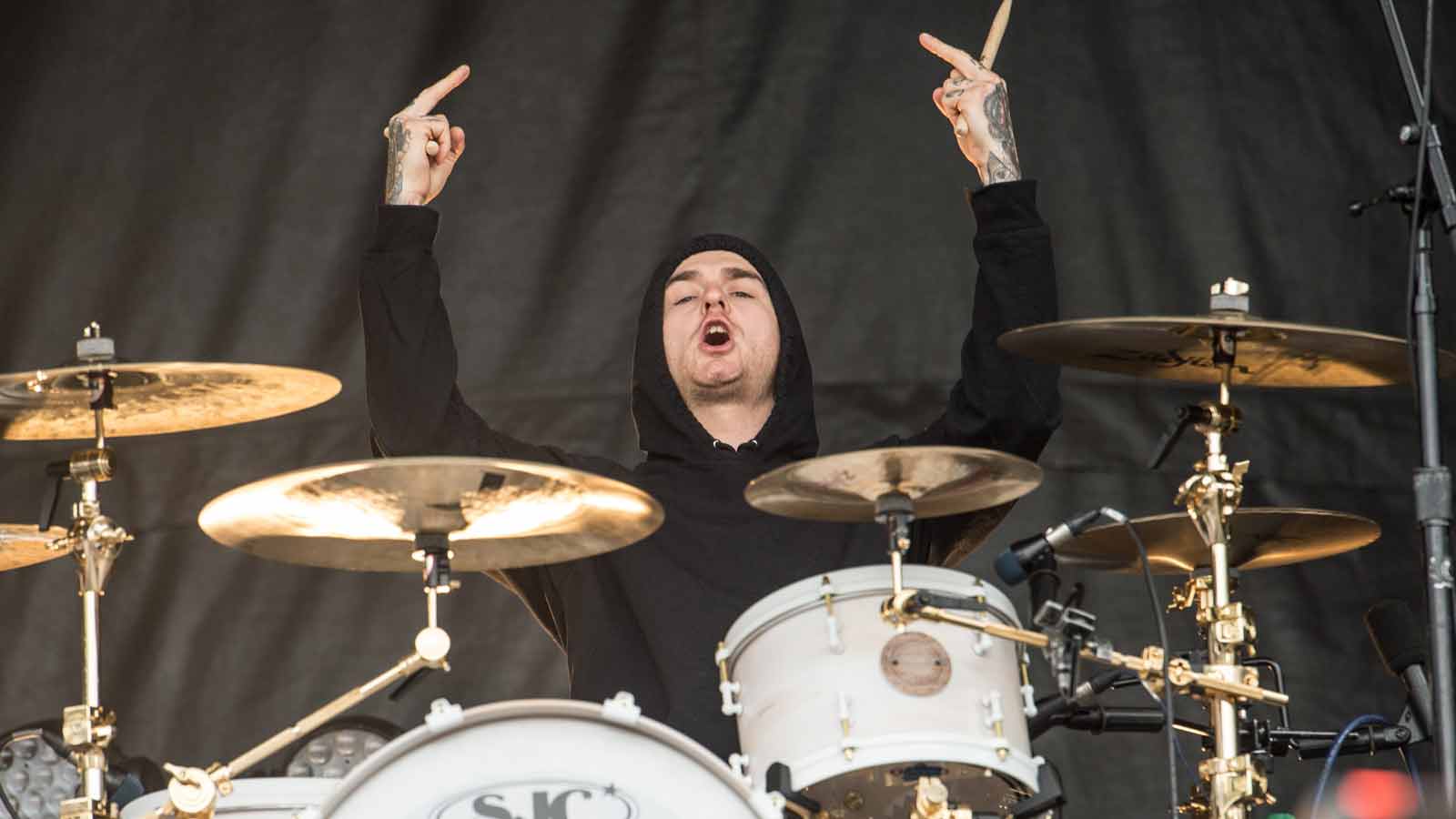
That's The Spirit
The production on That’s The Spirit was handled by the band. Why did you go down that route?
“The majority is Jordan and Oli [Sykes, frontman]. Honestly I’ve never seen anyone work like Jordan, he’s very gung-ho. He likes to go full-on. It’s cool, it’s still kinda new to him. He’s very excited, whereas we’ve been doing this for 12 years so sometimes we sit back and say, ‘Chill out mate, take it easy!’
"It was a good experience on the last [album]. When we did Sempiternal we had a big-name producer in this big studio. It’s weird when you’re recording with people like that. I think sometimes they feel like they have to put their two cents in just to make it feel like they’re doing something, whereas we want to bang a record out.
"Instead of having a big name producer we just used the budget for the studio."
"We’re not all about getting the perfect take. Get it down, get it done and do it as good as possible. The stuff’s going to get edited anyway, it’s a record. When we did this one we thought let’s just do it ourselves. We did the ‘Drown’ single ourselves. Jordan did it all.
"We thought, this is so easy and relaxed and let’s do the whole album ourselves. Instead of having a big name producer we just used the budget for the studio. We literally Googled the best studios in the world and it came up with Black Rock in Santorini, Greece. We were like ‘it looks amazing, let’s go there’. We took Al Groves who engineered the ‘Drown’ single with us.”
The drums sound huge on That’s The Spirit. How hands-on were you and what gear did you use?
“Jordan’s really good at that as well. I’m just bigging Jordan up completely here! He’s very musical and knows how to get good sounds. Same with Lee [Malia] on guitars. We know what sounds good.
"We’d just sit in the drum room and tweak stuff and get good sounds. This time we did it song by song whereas usually I’d go and do all the drum parts first, then we’d move onto guitar, then bass. This time we did a song on drums, then we’d do the guitars, then we’d move onto another song on drums.”
Did you have a drum tech out with you?
"It was the same drum kit I’ve recorded on everything pretty much, a Tama Starclassic. I love that drum kit."
“No, it was just us, and it was the same drum kit I’ve recorded on everything pretty much, a Tama Starclassic. I love that drum kit. I first bought it before we recorded our second CD.
"I had a Pearl Export before that and we were like, we need a new drum kit to make this sound good. I went to a drum store in Rotherham and a guy took me round a few kits. It looks cool too, orange sparkle. I’ve used that to record the last four records.”
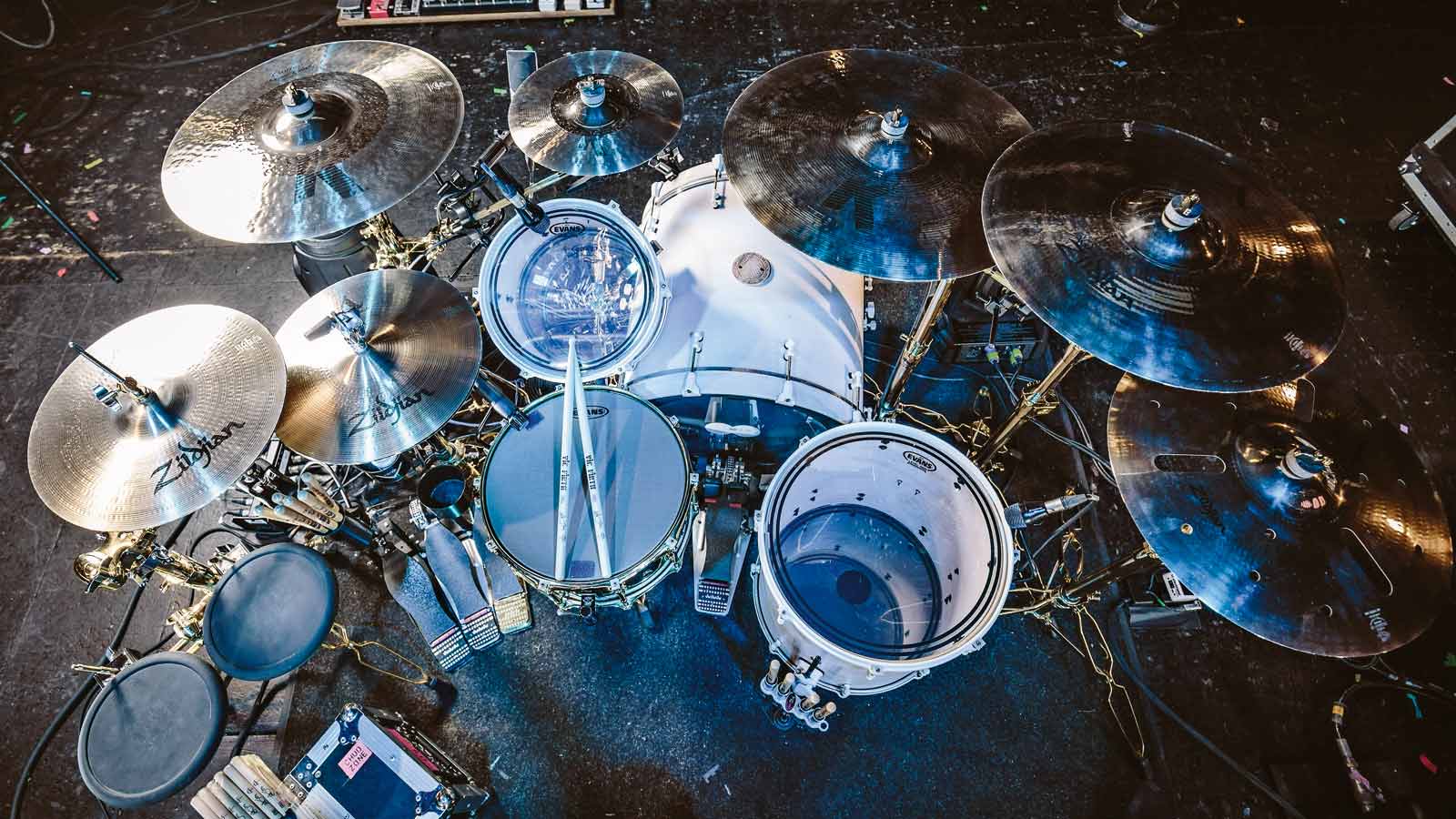
Matt Nicholls' gear
How often did you change heads in the studio?
“We changed everything up for each song. We might have done two songs on the same heads at some point. The snare head got changed a lot.
"I have a bunch of snares that sound really good, but I think the main one I used was my old Vinnie Paul snare. I had a Pearl one for ages and I loved it. It was fat and sounded really good. I used that for ages and started playing SJC and they said we need to get you an SJC snare, and they copied it.”
What cymbals were you using?
“I mixed it up a little bit. I tried some new ones and I ditched my China cymbal. We used it for the metal-y stuff. On this album it still has some parts like that but it’s not as mental as it used to be, so I’ve got an 18" A Custom EFX.
"I like the sound of the 18", it cuts through a bit more than the 20". I used a Session crash on my right. I started using it live, but it’s quite thin and I kept warping it, so I’m not using it anymore. I also used an A Custom Rezo crash.
"I spoke to Zildjian and asked to try some new stuff out. I also looked at what Abe [Cunningham] from Deftones was using. I took inspiration from him a little bit. I think I used all new cymbals apart from my 21" K Brilliant crash ride. I love that cymbal, I guess it’s my main, go-to cymbal.”
Do you consider yourself a drum geek, or is choosing gear just a practical thing to get the job done?
“I’m not a drum geek in the slightest. Zildjian are good to me. They send me a lot of stuff and it’s up to me to pick and choose.
"I did that before we went into the studio. I played a bunch and I ended up sending a bunch back. But they are good to me and they treat me well.”
You’ve had a long relationship with SJC too?
“[I’ve used SJC] since 2008, almost eight years. They’re nice boys, I like the company, I like what they’re all about and where they’re trying to take the company. They’re still pretty hands-on, like Mike [Ciprari, SJC owner] came out to the show in Boston. They’re younger than me which is crazy.”
With the band’s profile you must have had offers from other brands?
“Yeah, definitely, but loyalty is a big thing to me. I’m probably not ever going to leave them, unless something drastic happens.”
You’ve always played a small kit – one rack, one floor. Have you thought about adding anything to it?
“I used to have a gong drum. SJC made it for me. It was a 20" shell with a 22" kick head on top. It was just dead. To hear it naturally it sounded like whatever, but out front with a mic it made this massive boom.
"Jordan uses one of those now. He has a little set-up with Roland pads and has this big gong drum. I think I’m alright. Less is more, and I’m a bit lazy, so I’m happy.”
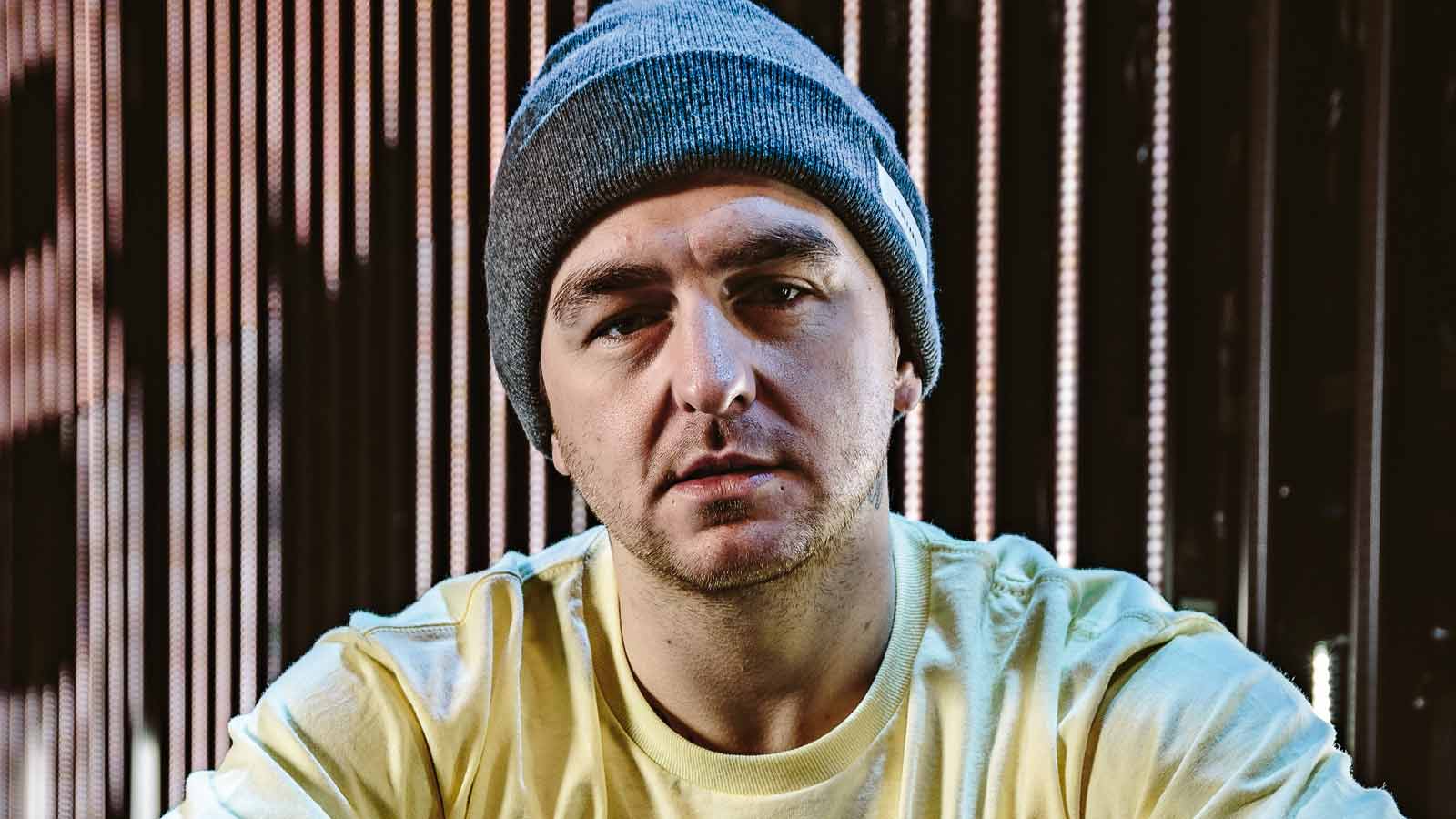
Clicks, live focus and overthinking
There are a lot of extra sounds and textures within the band’s music so you must play everything to click? How long have you been doing it?
“Since we put out the third record There Is A Hell… We started playing to a lot more electronic stuff and we knew we needed to play to a click. Usually, we’d not play to a click and I’d trigger our little electronic breaks on an SPD-S.
"On this one we needed to step up. Everything’s to a click. It’s made me better. I’d always get told ‘you’re playing too fast or too slow’. It makes me feel more confident, everything’s a lot more precise and I feel like I’m playing better. It’s helped me a lot.”
Was it a steep learning curve initially?
"I hate playing drums without a click now."
“I remember the first time, I didn’t even know what a metronome was. We went into record our first album and the guy was like we’re going to have to play to a click and I was like, ‘What?’
"It was so frustrating. After a day and a half I couldn’t get it. I was like, ‘This is not happening, I don’t know how to do this,’ and I was close to tears, y’know. And then it just clicked. At one point I just got it.
"When it came to playing live, we had a production day and they said we’re going to start playing live to a click, whereas I’d only ever used it in a studio situation. The first time we did I was like, ‘This is great.’
"I hate playing drums without a click now. I love feeling like I’m on it. Our live videos are all mapped to the click, so it just pulls everything together and makes it tighter.”
The band is playing major headline sets now. How much do you think about your performance and how do you like to pace your setlists?
"When I’m playing live I’m thinking, ‘Don’t f**k up.’"
“We all sit round and talk about what we want to play. It’s mostly stuff from the last two records to be honest with you. It comes across a lot better on big stages whereas old songs don’t as much. The new songs are fuller-sounding and proper songs. Back in the day we’d write stuff for little hardcore shows so people could mosh. Now it’s on a grander scale I guess.
“When I’m on stage I just focus. I’m not one of these drummers that likes doing stick tricks. That stuff makes me cringe, when I see drummers spinning their sticks after every hit. It puts me off if anything.
"I just think I’m there to be tight and keep it locked in. When I’m playing live I’m thinking, ‘Don’t f**k up.’ I’m not bothered about rocking out or anything like that. I wouldn’t say I’m static, I move a little bit, but when I’m on stage I’m focused.
"I’m not super confident either. I think confidence is a big thing with me. If my confidence gets knocked, if I make a tiny mistake on stage, I’ll be kicking myself for the rest of the gig and it’ll make me think more. If I’m thinking more I’ll probably f**k up more.
"It’s weird, when I’m not thinking and I just do it, I’m at my best, but it’s when I’m thinking that I’m prone to being a bit s**t.”
What does your warm-up routine consist of?
“I have to stretch nowadays! Andy my drum tech made me this kit. It started as a snare shell with a mesh head on top. It feels like the Roland V-Drums. I used to warm up on that and I asked Andy if he could make me a full kit. All the shells fit into each other so it’s good for moving around.
"I’ve got Zildjian Gen16 cymbals too. So I’ve got this full drum kit to warm up on. Half an hour before we play I’ll get my stage gear on, put some tunes on and just play along. I’ll do a couple of paradiddles, but it’s not a routine. I just jam and get my wrists and feet warmed up.”
The band has had a personal trainer on tour. Have you been getting involved?
"When we first started touring we were kids and we were just like, ‘Give me loads of beer, give me loads of food.’"
“He’s out with us now. It’s just general working out. When we first started touring we were kids and we were just like, ‘Give me loads of beer, give me loads of food.’
"It’s easy to get caught up in that, when you’re on tour anyway it can be hard to eat good. I put on weight and started looking like s**t to be honest with you.
"I started going to the gym a lot and I lost a lot of that. Then I stopped going, got back into drinking and was exactly the same again. Oli’s trainer at home, Tom, is our friend and we thought it would be a good idea to bring him out, and it’s been good.
"Everyone’s got into it, everyone’s looking better for it, feeling better for it. It’s easier when you’re on tour to get caught up in doing nothing but bad stuff, but it’s something we take seriously now.”
Has it had a positive effect on stage too?
“If I don’t work out in the day and play a show I can feel groggy. If I work out it makes me feel good, my body feels ready.
"If I’m sat around all day doing nothing and I’ve eaten crap I feel sluggish. Working out makes you feel energetic and positive, and you take that on stage with you.”
Which tracks are the most mentally and physically challenging?
“The old stuff takes a lot more. ‘Chelsea Smile’, definitely. It’s fast and pretty frantic and there’s a lot of weird foot patterns.
"It’s not hard to play, but when it comes up on the setlist I’m like, ‘Oh god!’ I’ve been playing that song since 2007 so I’m used to it.
"Of the new stuff, ‘True Friends’ is pretty demanding. There’s a big part in there, this big roll into this big tom fill. At first I was thinking how am I going to play this live? Now it’s second nature, I guess I’m used to it. Everyone’s knackered by the end of that song!”
How did you go about learning that fill?
“The way we write, we haven’t played the songs together as a band fully until we’ve recorded the album because we’ll write at the computer at Oli’s house then take it straight to the studio.
"It’s not like we’ve sat there and jammed it a million times. Some of the new songs we hadn’t played as a band. ‘True Friends’ was one of those.
"I’ve got a Roland kit at home. I’ll sit and play that and learn stuff on that, but it’s not like playing a real drum kit. It’s weird when you think I’ve got to learn how to properly play this and we’ve got to learn how to sound like a proper band and not make it sound like we’ve just learned it!
"I sit at home and figure it out on my Roland kit then I’ll get to practice and I’ll do it properly there.”
I'm MusicRadar's eCommerce Editor. In addition to testing the latest music gear, with a particular focus on electronic drums, it's my job to manage the 300+ buyer's guides on MusicRadar and help musicians find the right gear for them at the best prices. I dabble with guitar, but my main instrument is the drums, which I have been playing for 24 years. I've been a part of the music gear industry for 20 years, including 7 years as Editor of the UK's best-selling drum magazine Rhythm, and 5 years as a freelance music writer, during which time I worked with the world's biggest instrument brands including Roland, Boss, Laney and Natal.
